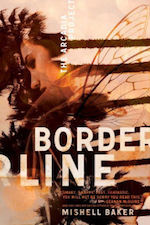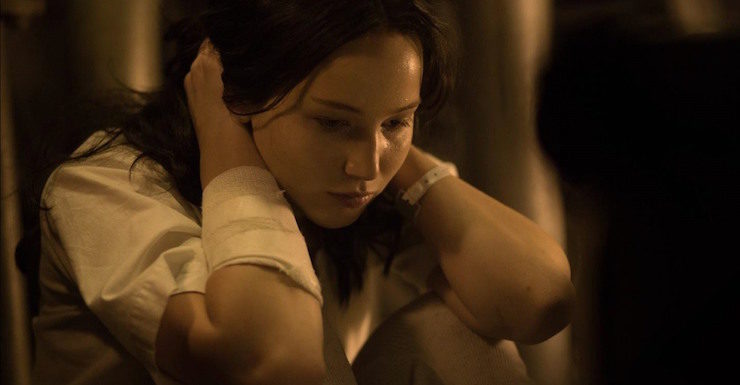Literary fiction has a well-established tradition of writing women with mental illness. From Laurie Halse Anderson’s young adult fiction—which explores anxiety, trauma, PTSD, and eating disorders—to classics like Plath’s The Bell Jar, literary fiction seems to have a long and storied love affair with mentally ill women. Whether these portrayals are positive, negative, or even accurate can and has been held up for long and fervent debate. For better or for worse, mentally-ill women have a place in literary fiction. Our stories are told over and over again, and will continue to be explored as long as people are fascinated by the idea of a woman coming undone.
Literary fiction loves us.
So, why doesn’t genre fiction love us too?
Contemporary science fiction and fantasy loves strong women. Even if their strength is problematic—even if it comes at the cost of their development and depth—they’re tough and fierce and SFF loves them that way. Even if their strength is a slender thread of steel in an otherwise soft and demure character—genre fiction values strong women.
But we shy away from flawed female characters. We struggle with multifaceted women, who are strong but have intrinsic struggles. We can deal with post-traumatic stress, to a point—unless it’s as severe as Katniss’ much-maligned struggle in Mockingjay. We can handle scars, as long as they don’t interfere with our preferred aesthetic. We are comfortable with low-level anxiety, with strong female characters who show moments of humanizing fear and self-doubt. We love women with low self-esteem, who get to later discover that they were beautiful all along.
But beyond those flaws, genre fiction seems to shy away in a way that literary fiction doesn’t. Literary fiction leans in close to look at women with addictions and schizophrenic disorders and narcissistic disorders and—in a recent, sweeping vogue—sociopathy. Sometimes, these stories lock women in attics or send them into the sea with pockets full of stones. Sometimes, these stories give mentally-ill women voices and families and careers. But regardless of the treatment mentally-ill women receive at the hands of literary authors, we are seen. We exist, and we participate in the world, and we hurt and heal and struggle and live.
But we are not invited into space. We are not invited to attend on the Faerie Queen. We don’t attend Hogwarts or fly TIE fighters.
Why not?
Perhaps it’s that writers of genre fiction struggle to reconcile their beloved strong female characters with the notion of mental illness. Surely female protagonists that are tough in the face of adversity, able to shrug off trauma and illness and loss and grief, couldn’t be mentally ill—that would undermine their unflinching, unbending strength. Right?
While those of us who live with mental illness can testify that “weakness” isn’t an adjective that describes our day-to-day, our societal narrative around mental illness and its treatment isn’t one of strength and courage. People who live with mental illness struggle with shame and fear and pain. Mental illness is not glamorous; it is not an easy thing to live with. It can’t be overcome by a moment of determination and gritted teeth. It is frequently marked by a lifelong battle for a sense of normalcy.
This is the fundamental misunderstanding of strength and weakness that underpins a larger narrative around mental illness as personal failing: a strong person, the story goes, would be able to buck up, shrug it off, and move on. A strong person can pull themselves up by their bootstraps into a state of mental health and well-being.
In reality, living with mental illness is rarely a journey towards a cure so much as it is a journey toward coping. The fortitude that’s required to cope with mental illness every day is a strength that goes beyond what’s required to shrug off a wound in the heat of battle. Perhaps if genre fiction had a deeper understanding of the endurance required to live with mental illness, we’d write even stronger female characters. Perhaps if more readers saw the work they do every day to live with mental illness described as strength, we would feel like it’s okay to see ourselves as strong.
Maybe it’s that SFF authors prefer to imagine worlds in which mentally-ill women do not exist. Perhaps—to assume good intentions—when genre fiction writers imagine alternate or future universes, they prefer to imagine worlds in which the pain and struggle of mental illness doesn’t touch women’s lives. Perhaps they see the weight that rests on the shoulders of women with mental illness, and they think, “I can stretch myself to imagine a world where they don’t have to go through this.”
It’s difficult, though, to reconcile this possibility with genre fiction’s approach to sexual violence. A major dissenting response to a call for less sexual violence in genre fiction was a well-reasoned disagreement to the effect of “so many women endure this; it would be erasure of their experiences to exclude sexual violence from the worlds we write.” This is a sensible argument—a responsible one, even. One in three women is likely to experience sexual violence in her lifetime, many authors argue, so why shouldn’t those experiences be included in the worlds of the women we write?
And yet, this same argument seems to elide the fact that one in three women is likely to experience mental illness—more than that, if the recent discussion around a possible gender gap in mental illness has it right. Theories around that gender gap suggest that women are twice as likely as men to be diagnosed with mental illness; while the suggested reasons for this are wide and varied, they don’t neglect the fact that women are more likely to experience gender-based violence and socioeconomic disadvantage than men. These risk factors for mental illness are certainly present in genre fiction—so why not their aftermath, fallout, and attendant struggles?
Perhaps it’s that writers of genre fiction cannot imagine a woman with mental illness having adventures. Perhaps, when we write characters who explore new planets or who battle evil sorcerers or who are chased by ghosts, we cannot fathom the survival of a woman who also dissociates or hears voices or sees the world through the fog of clinical depression. Perhaps we want happy endings for our characters, and we can’t imagine a happy ending that involves a continued, lifelong struggle with mental illness. Perhaps, when we consider how we’re going to wrap up our stories, we are uncomfortable with the idea of ongoing struggle even after the final, climactic battle has been won.
Perhaps we don’t believe that mentally ill women can have happy endings at all.
But then, there are books like Borderline.
 Millie, the strong female protagonist of Mishell Baker’s debut novel, lives with Borderline Personality Disorder. She’s tough and fierce and she carries the weight of her mental illness with her everywhere she goes. She cannot put her mental illness down and walk away from it; it doesn’t come with a magical cure. Her mental illness isn’t glamorous, and it isn’t easy, and it isn’t a secret superpower that manifests all wrong in the human realm—it’s Borderline Personality Disorder, and it makes her life harder.
Millie, the strong female protagonist of Mishell Baker’s debut novel, lives with Borderline Personality Disorder. She’s tough and fierce and she carries the weight of her mental illness with her everywhere she goes. She cannot put her mental illness down and walk away from it; it doesn’t come with a magical cure. Her mental illness isn’t glamorous, and it isn’t easy, and it isn’t a secret superpower that manifests all wrong in the human realm—it’s Borderline Personality Disorder, and it makes her life harder.
And it doesn’t stop her from participating in a world that includes magic.
Millie, and characters like her, offer a bright kind of hope to women with mental illness. The hope isn’t one of a cure or a solution—it’s one of participation. It’s one of existence. When Baker wrote Millie, she offered women with mental illness a seat at the SFF table. She opened a door that is too often closed to us, and she invited us in.
It’s time, genre fiction writers. It’s time to learn what Literary Fiction has known for decades: Women with mental illness are here. You know us, even if you don’t know that you know us. We live good lives and bad ones. We get pushed into attics and we run companies and we stare at the sea and we care for our children.
We want to ride dragons. We want to pilot spaceships. We want to discover.
Let us into your stories. Let us into your worlds.
Let us have adventures, too.
To read perspectives on physical disability in genre fiction—an issue which Sarah didn’t feel qualified to discuss here but which is also marked by underrepresentation—check out these excellent pieces by Feminist Sonar’s Elsa Henry.
Top image: The Hunger Games: Mockingjay (2014)
Sarah Gailey’s fiction has appeared in Mothership Zeta and Fireside Fiction; her nonfiction has been published by Mashable and Fantasy Literature Magazine. You can see pictures of her puppy and get updates on her work by clicking here. She tweets @gaileyfrey. Watch for her debut novella, River of Teeth, from Tor.com in 2017.










